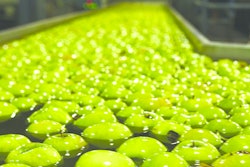Asheville, NC: The number of cases in a Buncombe County salmonella outbreak surged 30 percent over the weekend, county health officials said Monday.
Government food and health regulators are zeroing in on a tempeh ingredient sold by a Maryland company as the possible source of the local bacterial infection.
The FDA is now among the agencies involved in the investigation of ingredients in the cultured bean product. Meanwhile, officials with Smiling Hara Tempeh said the small Candler company is looking at restarting production after first doing a thorough review of its system.
The disease causes:
- Diarrhea (that may be bloody)
- High fever
- Headache
- Abdominal pain
The salmonella behind the outbreak is the rare paratyphi B type that causes paratyphoid fever, not to be confused with typhoid fever, said county Health Director Gibbie Harris. It is rarely fatal but can require hospitalization and is dangerous to the young, elderly and those with weak immune systems. It appears that some of the people newly sickened were exposed to the bacteria together, possibly at parties, Harris said.
"We don't know at this point because we are starting to do the interviews, but it is a possibility that it is a combination of food and person-to-person exposure," she said.
Harris said people should not be alarmed at the spike in cases, since small surges are typical in outbreaks.
"It is going to take a bit of time before this tapers off," she said.
Public education is important to stopping the outbreak, including an emphasis on good sanitation such as hand washing and appropriate food-handling techniques. The bacteria are spread from fecal matter and can be transferred by such things as unwashed or undercooked food, diapers or even light switches.
County communicable disease nurses and state agriculture workers traced the outbreak, which started in March, to the cultured bean product made locally. Agriculture officials said they found salmonella in a starter culture that Smiling Hara buys from a Rockville, MD distributor. The state's Health and Human Services Department is now testing to see whether it is the same type of salmonella found in the outbreak.
None of Smiling Hara's six employees had been sick, leading officials to believe the bacteria came from an ingredient. Along with the culture, there are two other ingredients: vinegar and beans — either soy, black or black-eyed peas.
FDA spokesman Allen Curtis declined to name the maker, saying his administration has a policy against it. Agriculture spokesman Brian Long said the distributor was Tempeh Online, though he didn't know who made it.
A man answering a phone number on the Maryland company's website said it was the wrong number. He then called back. When asked if the number was for Tempeh Online, he said, "How can I help you?"
After he learned he was speaking to a reporter, he said it was the wrong number and hung up. A text and message sent through Twitter and one sent through the website were not answered. The website stopped working later in the day.
Oliphant said the positive test on the culture showed Smiling Hara employees followed proper health and safety rules. "There is no sign of anyone getting ill or no cross-contamination," the executive manager said.
The first reported case in the outbreak was March 14, though communicable disease nurses believe there was one as early as Feb. 18. It was local health department nurses who realized through their investigation that the locally made tempeh might be the source.
Agriculture officials, meanwhile, had conducted a random test on the tempeh, which was made in a shared commercial kitchen. The paratyphi B has two strains.
Recently health workers realized the one afflicting county residents and visitors was the less severe one. That means antibiotics are no longer deemed necessary in all cases and workers in high-risk categories, such as food service, day care and health care can return to their jobs sooner than the original 30-day mandatory period.



















